Finding the Right Morgue Refrigerator for Your Facility
If you're looking for a morgue refrigerator for sale, here's what you need to know:
- Price Range: $3,000-$9,500 for standard units; $6,000-$50,000 for walk-in systems
- Top Types: Single-body, Multi-body (2-9 doors), Walk-in coolers, Bariatric units
- Key Features: Stainless steel construction, Independent cooling systems, Digital temperature controls
- Temperature Range: Positive (2-4°C) for short-term or Negative (-10 to -50°C) for long-term storage
- Leading Brands: Mortech Manufacturing, Müller, American Walk-In Coolers
A morgue refrigerator is an essential investment for funeral homes, hospitals, medical examiners' offices, and pathology labs. These specialized cooling units preserve deceased individuals with dignity while maintaining public health standards. Unlike standard refrigeration, morgue coolers are designed specifically to delay decomposition, prevent odors, and provide secure storage until final disposition or examination.
Modern units offer various configurations to match your facility's needs—from compact single-body cabinets that plug into standard outlets to expansive walk-in systems capable of storing dozens of decedents. The right choice depends on your case volume, available space, and specific requirements.
I'm Mortuary Cooler, a national-level morgue refrigerator supplier with extensive experience helping funeral professionals find the perfect morgue refrigerator for sale to match their specific facility requirements and budget constraints. Having supplied morgue refrigerator for sale solutions across the country, I understand the critical balance between quality, functionality, and value that funeral directors need.
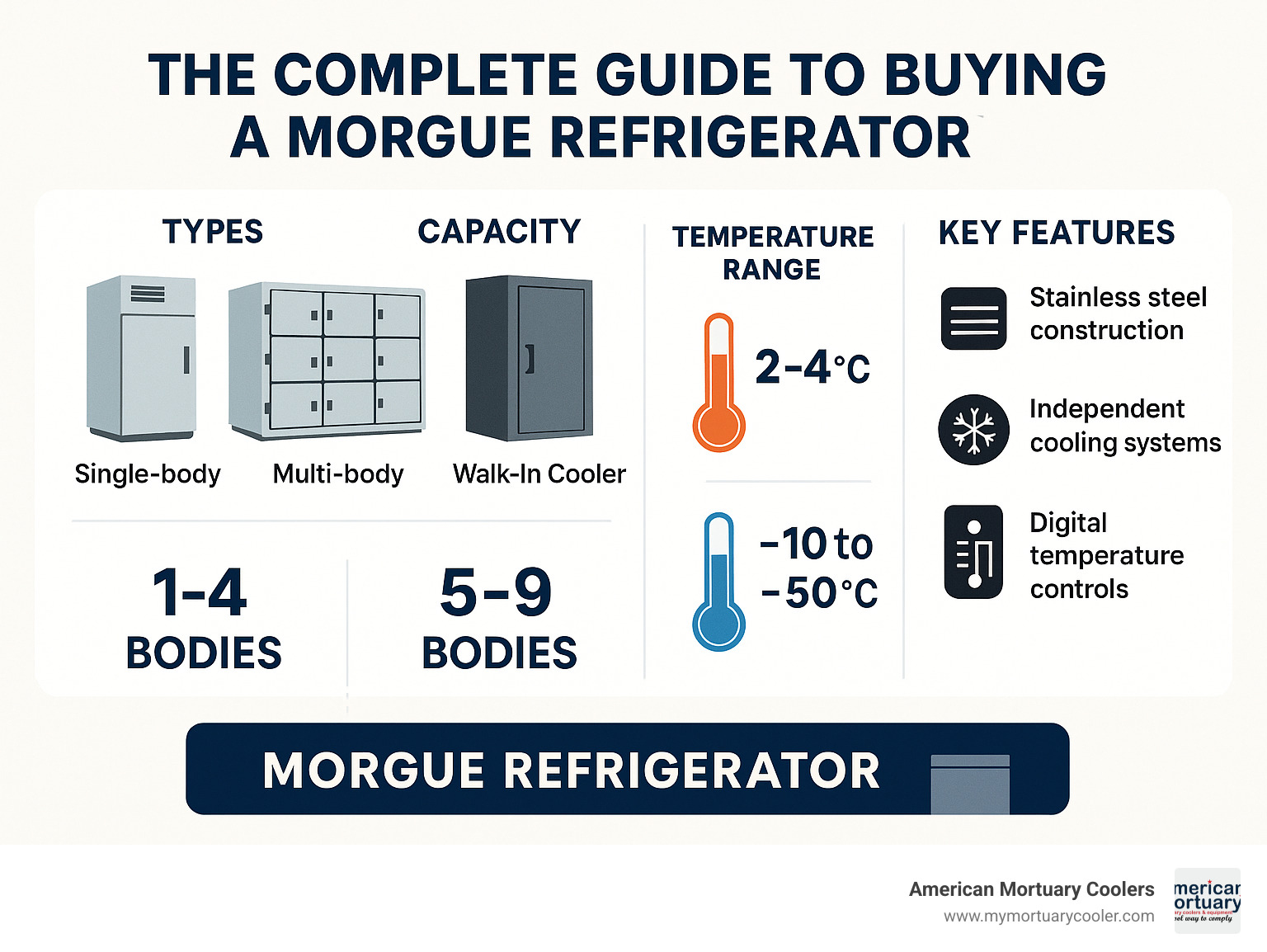
Important morgue refrigerator for sale terms:
- do refrigerated bodies at hospital morgues smell bad
- portable morgue refrigeration
- second hand mortuary fridges
What Is a Morgue Refrigerator and Why It Matters
When people ask about a morgue refrigerator for sale, they're looking for something quite different from your kitchen fridge. These specialized units (sometimes called mortuary coolers, cadaver freezers, or simply "body boxes") are purpose-built for the respectful temporary storage of human remains.
"A mortuary refrigerator is used to keep deceased bodies awaiting identification, burial, cremation, or autopsy in a constant refrigerated environment to slow decomposition," as our friends at Müller, one of the industry's leading manufacturers, put it.
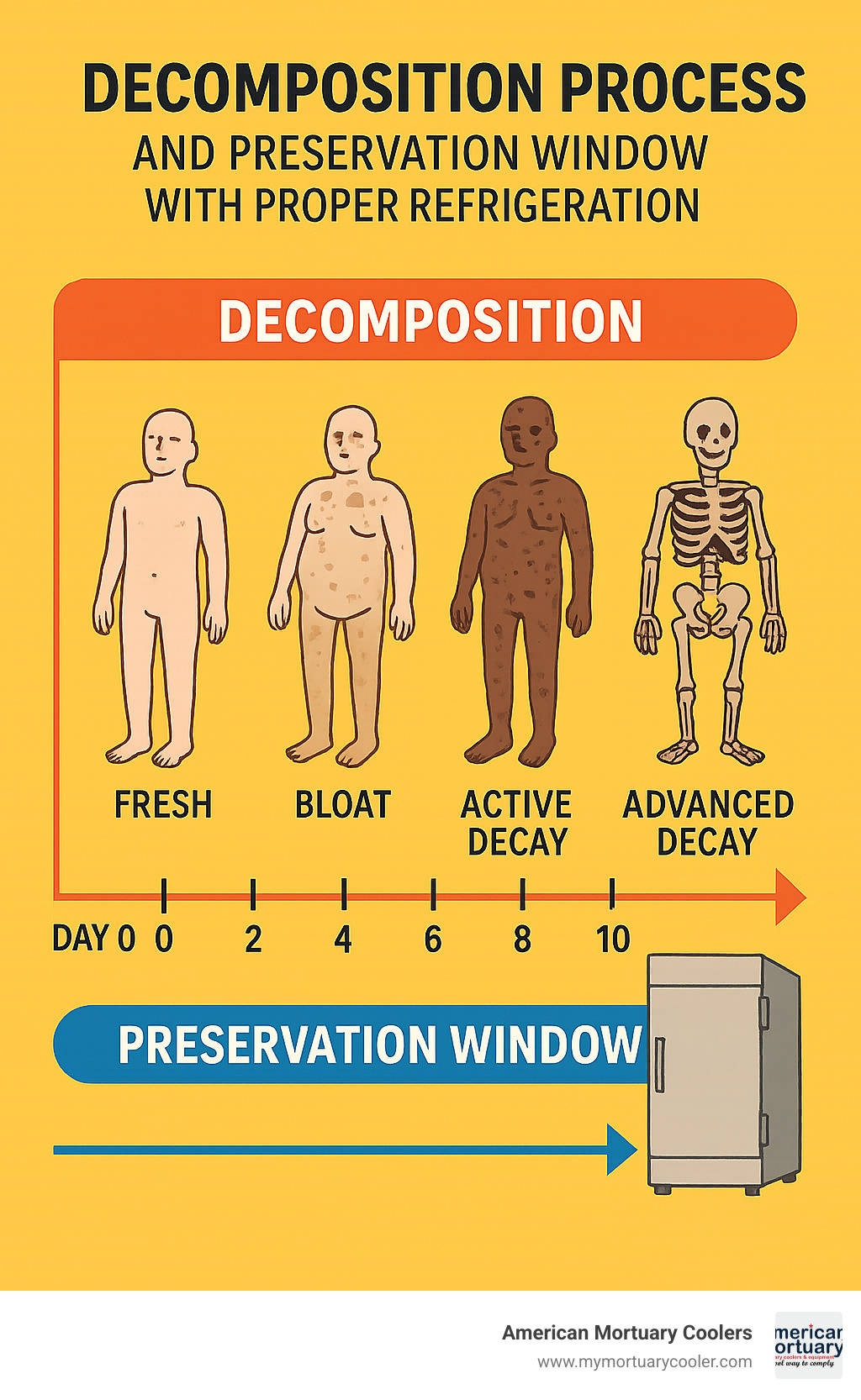
These aren't just cooling units – they represent the intersection where dignity, public health, and practical efficiency meet in death care. Without proper refrigeration, nature takes its course immediately after death, creating challenges that affect both respect for the deceased and community wellbeing.
Primary Purpose & Core Functions
At its heart, a morgue refrigerator serves several essential functions that standard refrigeration simply can't match.
First and foremost is precise temperature control – maintaining a consistent 2°C to 4°C in standard units or dropping to -10°C to -50°C in freezer models. This controlled environment is crucial for preservation, significantly slowing the biological processes that lead to decomposition.
Equally important is dignity maintenance. A properly functioning unit preserves the physical condition of the deceased for identification, viewing, or medical examination. As one experienced mortuary equipment specialist told us, "We manufacture our mortuary refrigerators using high-quality materials and parts to ensure the dignity of the deceased is maintained throughout their final journey."
Finally, these units provide secure storage – a dedicated, lockable space for bodies awaiting their final disposition, whether that's burial, cremation, or another arrangement chosen by the family.
How Morgue Refrigerators Protect Public Health
Beyond their preservation role, morgue refrigerators serve as important guardians of public health:
They provide essential pathogen containment by inhibiting bacterial growth that could otherwise create health hazards. The controlled low temperatures significantly reduce odor release by slowing the formation of odor-causing compounds that naturally develop during decomposition.
Many modern units feature individual compartments with separate cooling systems, preventing cross-contamination between stored remains. Some advanced models even incorporate silver ion anti-bacterial treatments that actively work to inhibit pathogen growth on surfaces.
According to OSHA standards, proper body storage facilities must maintain specific temperature ranges and ventilation requirements to ensure both worker safety and public health protection. This scientific approach to preservation aligns with best practices in autopsy and post-mortem care, creating a safer environment for everyone involved in the death care process.
When considering a morgue refrigerator for sale, understanding these fundamental purposes helps facility managers make informed decisions that honor the deceased while protecting the living.
Types of Morgue Refrigerators for Sale
When you're searching for a morgue refrigerator for sale, you'll find several distinct options designed to fit different needs. Whether you run a small funeral home or a large hospital, understanding these differences will help you make a smart investment that serves your facility for years to come.
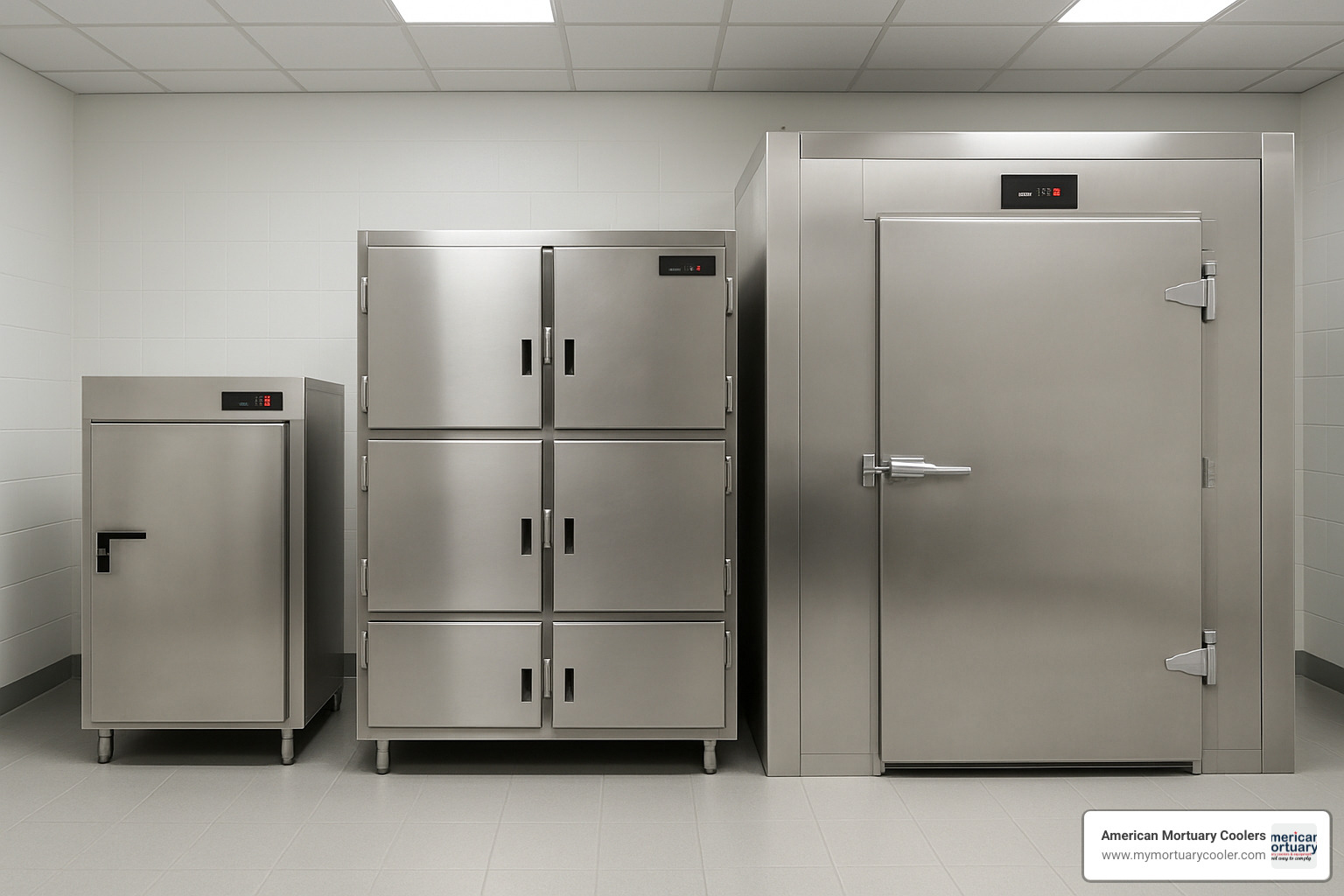
Single-Body & Compact Cabinets
For smaller facilities or those with limited space, single-body refrigerators offer a practical solution. These units typically measure about 3 feet wide by 7-8 feet long and stand about 5 feet high. They're designed to hold one body at a time and usually connect to a standard 110V outlet – truly plug-and-play.
Many models come with casters so you can easily move them around your facility when needed. Priced between $3,000-$6,000, these compact units are perfect for small funeral homes, rural hospitals, or facilities that handle fewer cases.
"Our top-selling model is the 2-Body Mortuary Cooler," one supplier told me recently. "It hits that sweet spot of compact dimensions with all the essential functionality smaller operations need."
Want to explore more options? Check out more info about morgue fridge options.
Multi-Body & Tiered Units
If you run a medium-sized operation, multi-body refrigerators give you expanded capacity without requiring a dedicated room. These versatile units come in 2, 3, 4, 6, 8, and 9-door configurations to match your specific needs. You can choose between front-loading, side-loading, or pass-through designs depending on your workspace layout.
The tray systems feature telescoping slide rails with extruded aluminum and nylon rollers, making body transfer smooth and dignified. I particularly like how the tiered storage maximizes capacity within a limited footprint – a smart design feature when space is at a premium. Depending on capacity and features, these units typically cost between $6,000-$15,000.
As my friend at American Walk-In Coolers pointed out, "Our 3-tier rolling rack style cooler measures just 57.5" × 8' × 8' high but can accommodate multiple bodies efficiently. It's all about smart space utilization."
Walk-In & Roll-In Systems
For high-volume facilities – major hospitals, medical examiners' offices, and large funeral homes – walk-in systems represent the gold standard in body storage. These systems can accommodate anywhere from 5 bodies to 50+ with the right rack configuration.
Built with modular prefabricated panels (typically 4" thick) with high R-value insulation, these systems offer incredible flexibility. Need to relocate or expand? These units can be disassembled and moved as your needs change – something fixed units simply can't offer.
Safety features include oversized doors with OSHA-compliant safety release handles, vapor-proof LED lighting, digital temperature displays, and sophisticated alarm systems. The price range reflects their professional-grade capabilities: $15,000-$50,000 depending on size and features.
Mortech Manufacturing, America's largest morgue refrigeration manufacturer, emphasizes that "walk-in coolers and freezers provide your facility with the best solution to use space and maximize cadaver storage." After visiting several facilities with these systems, I have to agree.
Bariatric, Mobile, and Specialty Coolers
Some situations call for specialized solutions beyond standard refrigeration. Bariatric units feature wider compartments and reinforced trays designed specifically to accommodate larger individuals with dignity and care.
Mobile trailers offer self-contained refrigeration systems built into transportable units – perfect for disaster response or when you need temporary capacity expansion during unusual circumstances.
For facilities requiring both short and long-term storage, dual-temperature units combine refrigerator and freezer systems in one package. These specialized solutions vary widely in price, typically running $10,000-$30,000 depending on specifications.
As one manufacturer explained to me, "Need a standalone bariatric roll-in storage? We offer bariatric roll-in refrigerators designed for oversized cadaver storage to meet pathology and anatomy lab requirements." It's this kind of specialized thinking that helps facilities handle every situation with dignity.
Choosing a Morgue Refrigerator for Sale That Fits Your Capacity
Planning for the right capacity is perhaps the most important aspect of selecting a morgue refrigerator for sale. Start by calculating your average and peak case volume, then plan for reasonable growth in your service area. Remember to account for seasonal variations – many facilities experience higher demand during winter months.
Also consider your typical holding time – longer average holding periods naturally require more capacity. And of course, balance all these needs against your available floor space.
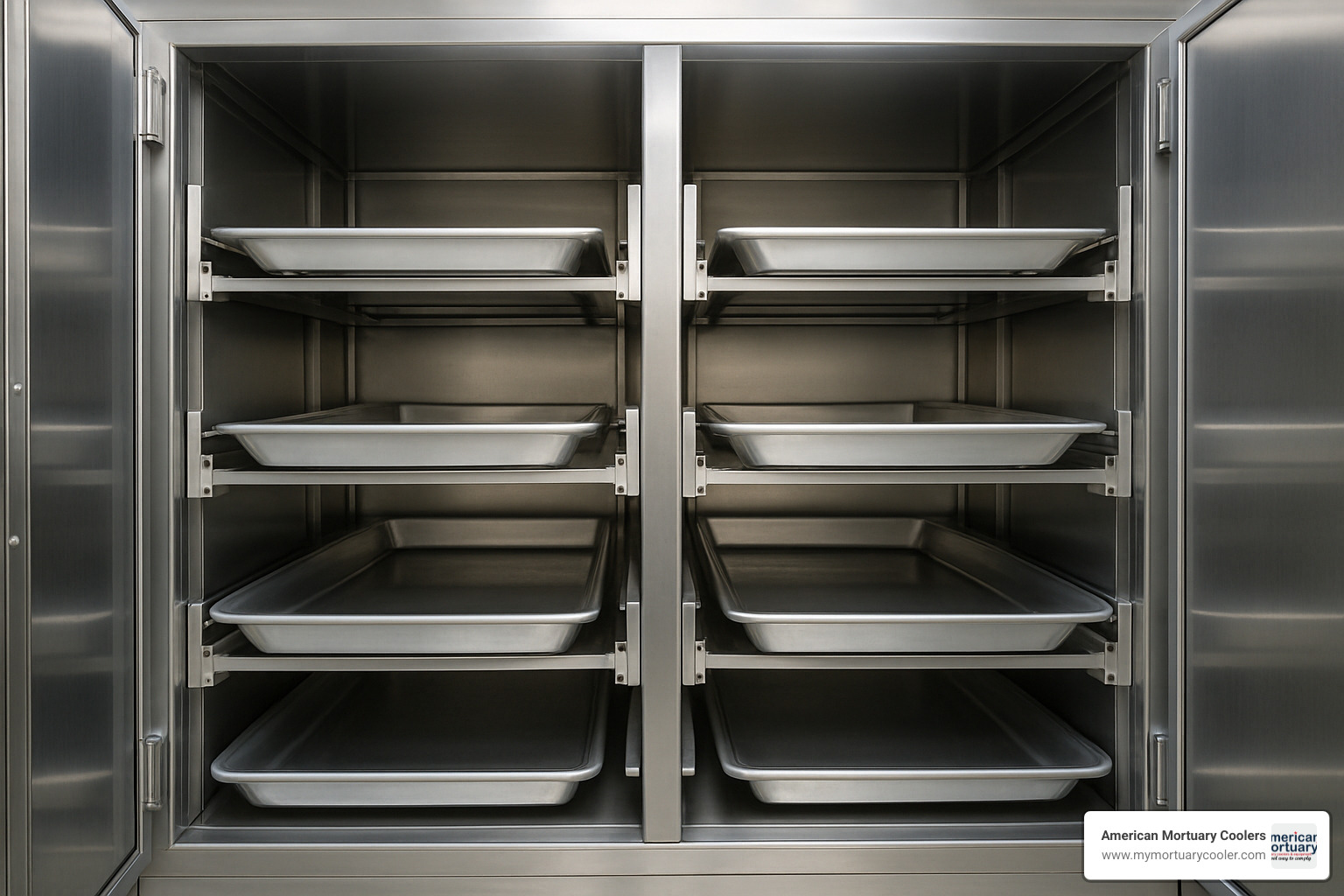
"We recommend selecting a unit with at least 25% more capacity than your current average needs to accommodate unexpected surges," advised an industry veteran I spoke with who has been supplying mortuary equipment for over 20 years. This buffer can be a lifesaver during unexpected situations.
Finding the right morgue refrigerator for sale isn't just about the specs – it's about finding a solution that respects the deceased, supports your staff, and serves your community with dignity and care.
Key Features, Materials, and Specs to Compare
When you're looking for a morgue refrigerator for sale, it's a bit like shopping for a car – what's under the hood matters just as much as how it looks. Let's chat about what separates a quality unit from something you might regret purchasing down the road.
More info about buying mortuary refrigerators
Why Stainless Steel Rules
There's a good reason why stainless steel has become the gold standard in morgue refrigeration – it's simply the best material for the job.
Think about what these units go through daily. They're exposed to bodily fluids, harsh cleaning chemicals, and constant use. Stainless steel handles all this with grace. Its non-porous surface doesn't give bacteria anywhere to hide, making it much easier to keep clean and sanitary. It won't rust or corrode like other metals might, and it maintains its structural integrity year after year.
"We use type 304 stainless steel with a No. 4 finish on our front panels," one of our colleagues in the industry explained to me recently. "It's the same hospital-grade material used in surgical environments."
Beyond the practical benefits, there's something reassuring about the clean, professional appearance of stainless steel. It communicates care and respect – exactly what families expect when entrusting their loved ones to your facility.
Must-Have Safety & Monitoring Features
Today's morgue refrigerators are a far cry from the simple coolers of yesterday. Modern units come equipped with impressive technology that ensures safety and compliance.
Digital temperature controls have replaced old analog systems, giving you precise regulation with easy-to-read displays. Many premium units now include 24-hour data logging that tracks and records temperature fluctuations – a feature that's invaluable for regulatory compliance.
Security has improved too. Password protection prevents unauthorized temperature adjustments, while multi-system failure alarms will alert you visually and audibly if temperatures drift outside the safe range. For facilities in areas with unreliable power, emergency battery backups are worth their weight in gold.
One feature I particularly appreciate is the OSHA-compliant safety door release. These handles allow opening from inside – a small detail that could prevent a terrible accident if someone were accidentally locked inside.
As one manufacturer told me, "Our optional temperature tracking system doesn't just monitor – it documents everything with password protection, giving you peace of mind and proof of compliance."
Energy & Environmental Considerations
Let's talk about something that affects both your conscience and your bottom line: energy efficiency.
Modern morgue refrigerators for sale are increasingly designed with sustainability in mind. The best units comply with the Federal Energy Independence & Security Act of 2007, using high-efficiency components that reduce your energy bills while maintaining perfect cooling performance.
Insulation quality makes a huge difference too. The industry has moved toward 4-inch closed-cell density ECO foam, which provides superior thermal efficiency without the environmental drawbacks of older insulation types.
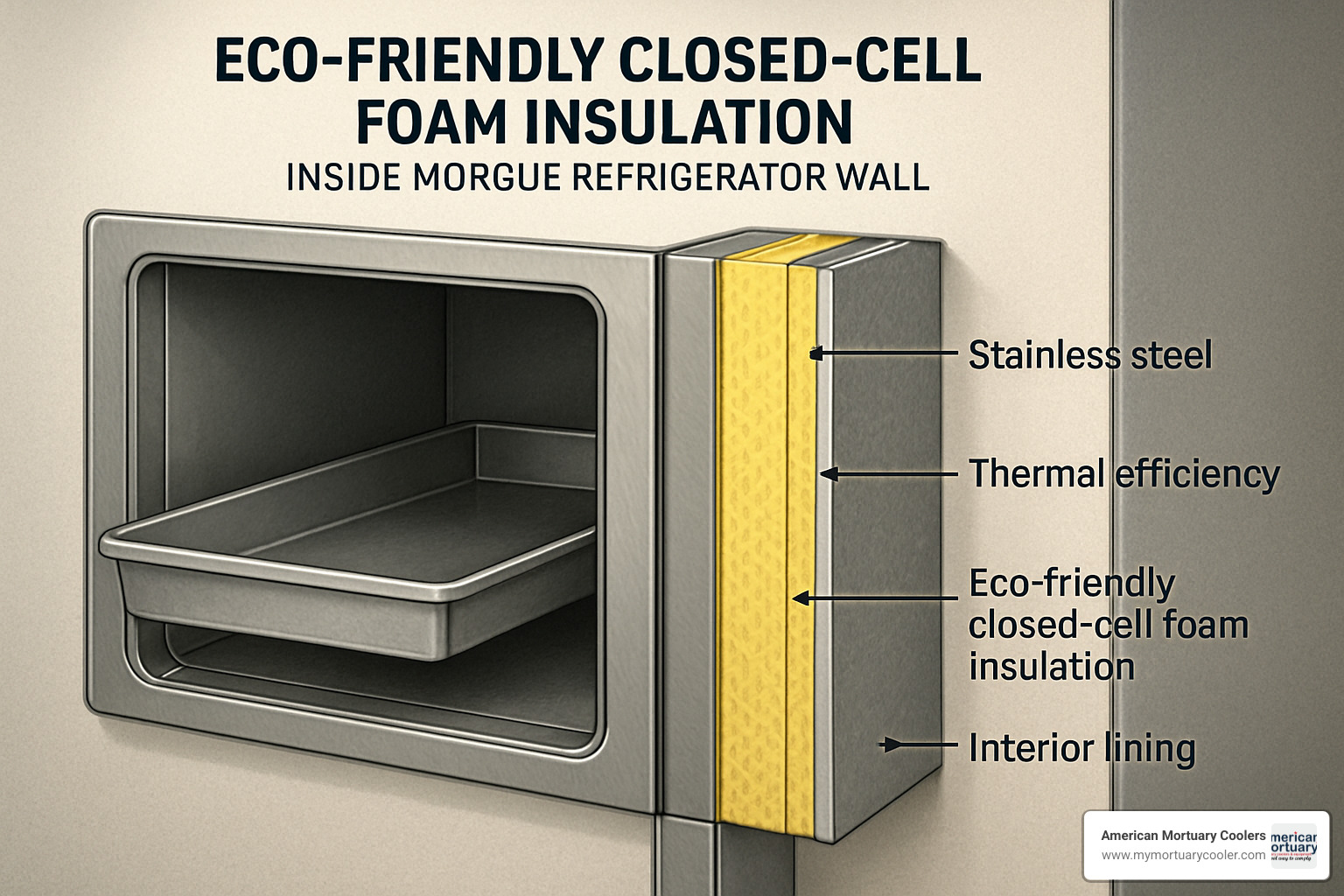
Even small details matter – like LED lighting instead of traditional bulbs. LEDs use a fraction of the energy and generate almost no heat, reducing the workload on your cooling system.
Many facilities are also choosing units with environmentally responsible refrigerant systems. These fluoride-free systems perform just as well as traditional refrigerants but without the harmful environmental impact.
"Our walk-in panels don't just meet minimum standards – they exceed them," an American manufacturer recently shared with me. "We're proud to be part of the industry's movement toward more sustainable practices."
At American Mortuary Coolers, we understand that when you're looking for a morgue refrigerator for sale, you need equipment that balances quality, durability, and value. The features we've discussed aren't just nice-to-haves – they're essential considerations that will affect your daily operations for years to come.
Positive vs Negative Temperature Units
When you're looking for a morgue refrigerator for sale, one of the most important decisions you'll face is choosing between positive and negative temperature units. This choice isn't just about numbers—it directly affects how you'll care for the deceased and your operational costs.
| Feature | Positive Temperature (2-4°C) | Negative Temperature (-10 to -50°C) |
|---|---|---|
| Primary Use | Short-term preservation | Long-term preservation |
| Typical Applications | Funeral homes, hospitals | Forensic labs, disaster response |
| Decomposition Effect | Slows decomposition | Halts decomposition |
| Viewing Suitability | Preserves viewable condition | May cause tissue changes |
| Energy Consumption | Lower | Higher |
| Cost | Less expensive | More expensive |
| Thawing Required | No | Yes, before autopsy/viewing |
When to Pick a Positive-Temp Morgue Refrigerator for Sale
Most funeral homes and hospitals choose positive temperature units (running at about 35-39°F or 2-4°C) for good reason. These units keep bodies in a chilled—not frozen—state that works perfectly for typical funeral service timelines.
"Our positive-temp units are our most popular sellers," shares our lead product specialist at American Mortuary Coolers. "They provide the perfect balance of preservation and practicality for most funeral homes."
The benefits are practical and financial. Positive temperature units maintain natural appearance of the deceased, making them ideal when viewings are planned. They also consume less energy than freezer units, helping keep your utility bills manageable. For the typical 3-7 day holding period most facilities need, these units provide completely adequate preservation without excess cooling.
Another practical advantage? No thawing time needed. Bodies can be accessed immediately for preparation, embalming, or viewing—a significant workflow benefit for busy funeral homes. And let's not forget they cost less initially, making them easier on your startup budget.
When to Pick a Negative-Temp Morgue Refrigerator for Sale
Negative temperature units (running between 14°F to -58°F or -10°C to -50°C) serve more specialized needs. These aren't your everyday funeral home coolers—they're designed for situations where extended preservation is essential.
Forensic facilities often choose these units because investigations can take weeks or months, and they need to halt decomposition completely, not just slow it down. Research facilities and medical schools that keep bodies for anatomical studies also rely on freezer-temperature storage.
Disaster response teams face unique challenges too. "After natural disasters, when identification might take extended periods, our negative-temp units become crucial tools," explains our disaster response specialist. "They give authorities the time they need without compromising evidence."
Remote locations with limited access to funeral facilities also benefit from freezer units. When transportation might be delayed by weather or distance, the extra preservation time becomes invaluable.
Some forward-thinking facilities opt for dual-temperature units or maintain both types to handle whatever situations arise. This flexibility can be especially important for facilities serving diverse needs or rural areas where they might be the only option for miles around.
While negative-temp units offer superior long-term preservation, bodies will need thawing time before procedures or viewings can take place—an important workflow consideration when planning your facility operations.
Scientific research on cadaver care confirms that temperature selection significantly impacts tissue preservation quality and duration, making this choice one of the most consequential decisions when selecting a morgue refrigerator for sale.
Pricing, Brands, and Buying Considerations
When you're searching for a morgue refrigerator for sale, you'll quickly find a wide price spectrum that reflects the vast differences in quality, capacity, and features. Understanding what drives these price variations can help you make a smart investment that balances your budget with your facility's specific needs.
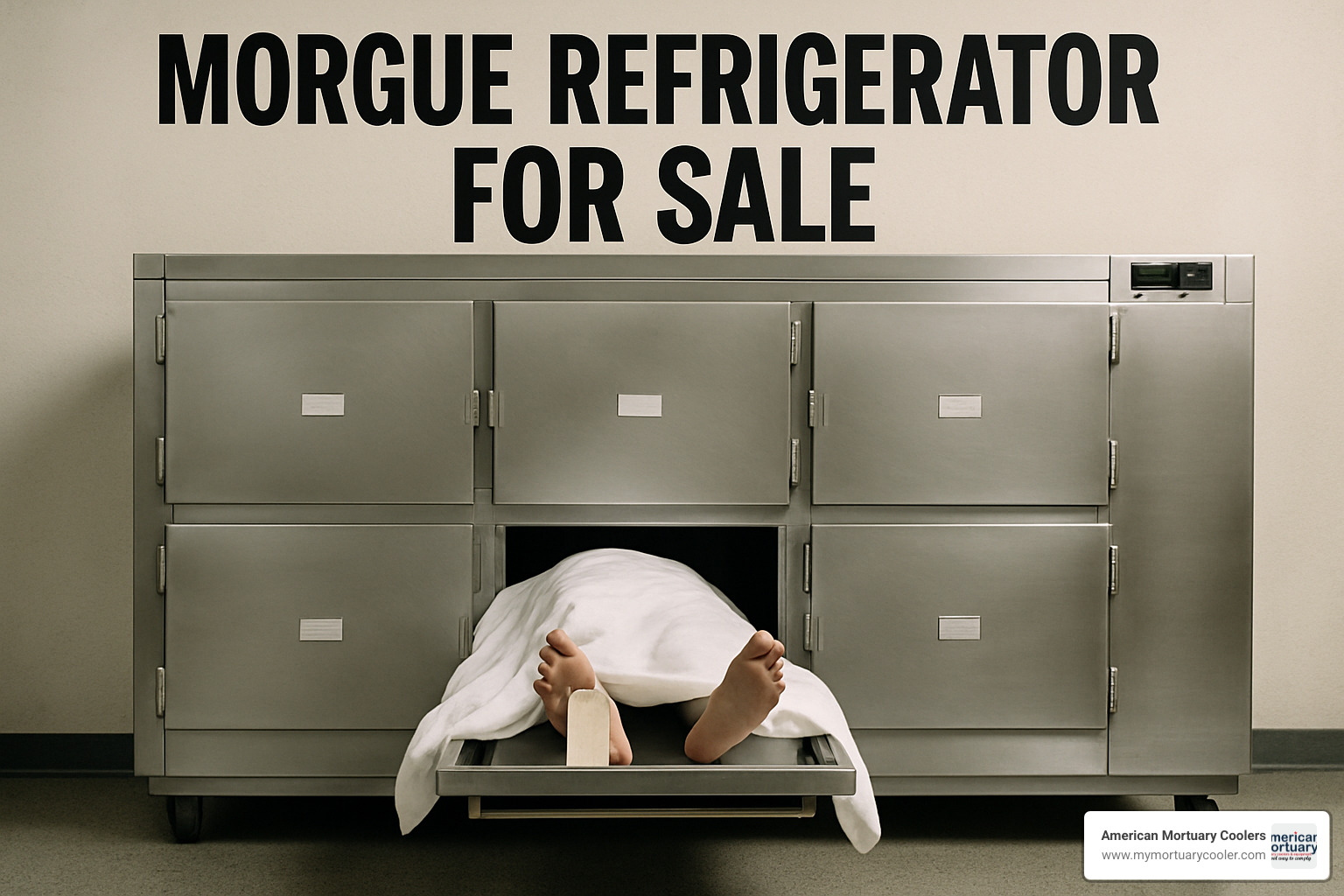
Factors That Drive Cost
You might wonder why one morgue refrigerator for sale costs $3,000 while another is priced at $15,000 or more. It's not just about size – though capacity certainly matters. A single-body unit typically starts around $3,000, while larger multi-body systems can easily reach $15,000 or more.
Beyond capacity, the materials make a significant difference. All-stainless steel interiors are the gold standard, offering superior durability and sanitation features, but they come at a premium compared to aluminum alternatives. As one manufacturer told me, "We use hospital-grade stainless because it simply lasts longer in these demanding environments."
The cooling technology is another major price factor. Units with independent compressors for each compartment cost more upfront but offer crucial reliability – if one section fails, the others keep running. This redundancy can be priceless when preserving human remains.
Shipping and installation costs shouldn't be overlooked either, especially for larger walk-in units. One funeral director I spoke with was surprised when shipping added nearly $2,000 to his purchase of a 6-body system. "I wish someone had told me to budget for that from the beginning," he shared.
Snapshot of Trusted Manufacturers
The mortuary refrigeration world has several respected manufacturers with proven track records. Mortech Manufacturing stands out as the largest US-based producer, boasting an impressive portfolio of over 9,747 completed projects during their 39 years in business. They've become particularly known for their walk-in systems and body box refrigerators that can accommodate anywhere from 2 to 50 bodies.
For those seeking European engineering precision, Müller has built a strong reputation for their high-performance refrigeration components and remarkably customizable temperature control systems. Their mortuary units feature independent refrigeration systems for each compartment – a premium feature that provides peace of mind.
American Walk-In Coolers (AWIC) proudly emphasizes their 100% American-made construction and compliance with energy efficiency standards. They specialize in mortuary walk-in storage coolers, offering configurations from 2-body to 4-body in both standard and wider models.
Mopec, now under Mortech's umbrella, takes an integrated approach by combining refrigeration with other mortuary equipment to create complete workflow systems – something many busy facilities appreciate.
"Always ask for references from facilities similar to yours," advised a mortuary consultant I interviewed. "Nothing predicts your satisfaction better than hearing from someone with needs like yours who's already using the equipment."
Budgeting Tips Before You Search "Morgue Refrigerator for Sale"
Smart budgeting means looking beyond the sticker price. When I helped a small rural funeral home select their first dedicated morgue refrigerator, we calculated the total cost of ownership by factoring in expected energy consumption, routine maintenance, and the unit's projected lifespan.
Many suppliers now offer financing options with favorable terms – some even with 0% down with approved credit. This can be a game-changer for smaller operations watching their cash flow. Extended service contracts, while adding to upfront costs, can provide valuable budget predictability for maintenance expenses over the unit's lifetime.
Energy efficiency deserves serious consideration too. A funeral director in Arizona told me, "I paid $2,000 more for our energy-efficient model, but we're saving about $45 monthly on electricity. It'll pay for itself before the warranty even expires."
Don't forget to budget for essential accessories. Body boards, trays, and racks aren't always included in the base price but are absolutely necessary for daily operation. And site preparation costs can surprise the unprepared – electrical upgrades or floor reinforcement may be necessary depending on your facility's current setup.
When comparing quotes from different suppliers, make sure you're evaluating comparable specifications and included services. As one purchasing manager for a multi-location funeral service provider wisely noted, "The lowest bid often doesn't include critical components or services you'll end up paying for later anyway."
More info about definitive buying guide
Delivery, Installation, and Maintenance Roadmap
So you've found the perfect morgue refrigerator for sale - congratulations! But now comes the part many people overlook: getting it to your facility, setting it up correctly, and keeping it running smoothly for years to come. Let's walk through what you need to know to make this process as smooth as possible.
Scientific research on cadaver care
Shipping & On-Site Setup
The delivery experience varies dramatically depending on what you've purchased. If you've chosen a compact single or two-body unit, you're in luck - these typically arrive fully assembled and ready to use. Just find a suitable location, plug it in, and you're good to go.
Medium-sized units with 3-6 body capacity usually ship "knockdown" style, which is a fancy way of saying "some assembly required." Don't worry though - the process is straightforward with the right preparation.
For walk-in systems, delivery gets more complex. These arrive as a set of modular panels that need to be fitted together on-site. Unless you have experienced staff, I'd strongly recommend professional installation for these larger systems.
Before your new morgue refrigerator for sale arrives, make sure you've prepared properly. Measure your doorways, hallways, and elevators to confirm they can accommodate the unit's dimensions. Ensure your flooring can handle the weight, and that you have the proper electrical service available. If you don't have a loading dock, add lift-gate service to your delivery (typically $75-150 extra) - your back will thank you!
When your unit arrives, inspect it carefully before signing any paperwork. Note any damage immediately on the freight documents - this is crucial for warranty claims. Have your tools ready for assembly if needed: a Cam-Lock wrench, drill, socket wrench, level, rubber mallet, and tape measure will cover the basics.
Routine Cleaning & Disinfection
Keeping your morgue refrigerator clean isn't just about appearances - it's essential for health, safety, and equipment longevity. Develop a regular cleaning routine and stick to it religiously.
After each use is ideal, but at minimum, plan for weekly cleaning. Use only EPA-approved disinfectants that are compatible with stainless steel - harsh chemicals can damage surfaces and components. Remove trays for separate cleaning, and pay special attention to door gaskets, which can trap residue and become breeding grounds for bacteria.
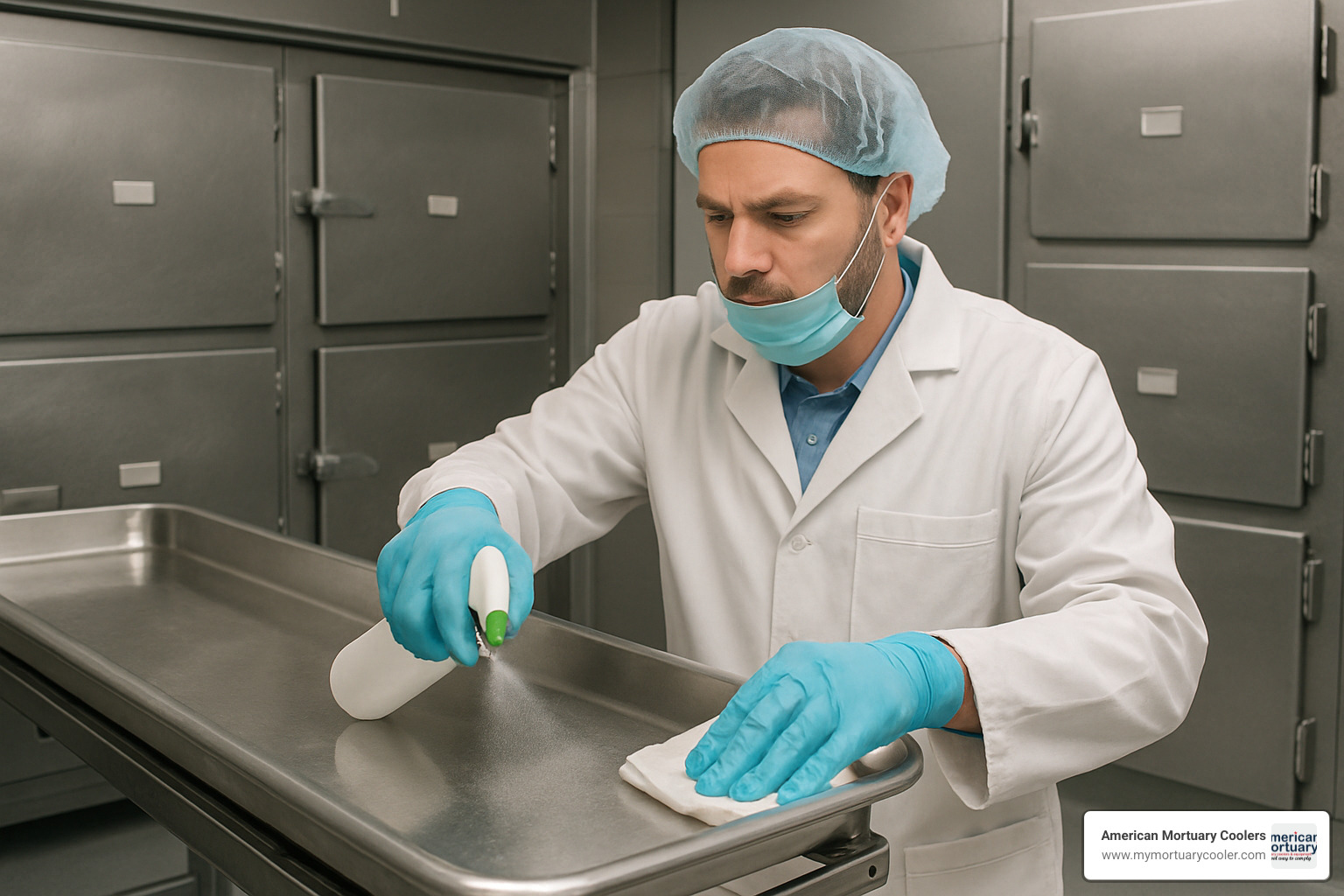
Many modern units incorporate silver ion anti-bacterial treatments in their construction, which helps fight pathogens between cleanings - but this is a supplement to, not a replacement for, regular disinfection. Keep detailed cleaning logs for both compliance purposes and quality assurance.
Think of it this way: your morgue refrigerator is a medical device, and it deserves medical-grade care. The families you serve deserve nothing less.
Service, Warranty, and After-Sales Support
Even the best equipment needs occasional service, so understanding your warranty coverage and establishing service protocols before problems arise is simply good business.
Most manufacturers offer a standard 1-year warranty on compressors, with options to extend coverage up to 5 years for additional peace of mind. Structural components like panels typically carry longer warranties - often 10-15 years. Before purchasing, clarify exactly what's covered and what isn't.
Establish expectations for emergency service response times with your supplier. How quickly can they get a technician to you if something fails? Do they stock critical replacement parts, or will you face lengthy delays waiting for components to arrive from overseas? Is technical support available 24/7, or only during business hours?
Develop a preventative maintenance schedule to catch small issues before they become big problems. This typically includes:
- Quarterly cleaning of compressors and condensers
- Checking and replacing door gaskets as needed twice yearly
- Annual calibration of temperature monitoring systems
- Regular testing of safety features and alarm systems
At American Mortuary Coolers, we understand that downtime isn't just inconvenient - it can significantly impact your ability to serve families with dignity. That's why we prioritize responsive service and maintain a comprehensive stock of replacement parts for all the units we sell.
Proper maintenance isn't just about preventing breakdowns - it's about extending the life of your investment. A well-maintained morgue refrigerator can provide reliable service for 15+ years, while neglected equipment might need replacement in half that time.
Complementary Equipment & Compliance Checklist
When you're looking for a morgue refrigerator for sale, it's just one piece of the puzzle. Creating a complete mortuary operation requires thoughtful consideration of complementary equipment and staying on top of regulatory requirements.
More info about freezer morgue options
Building a Full Mortuary Workflow
Think of your mortuary operation as a well-choreographed dance. Each piece of equipment plays a vital role in creating a respectful, efficient workflow.
Body transport equipment forms the foundation of safe handling practices. Quality mortuary cots, trolleys, and lifts not only protect your staff from injury but also ensure dignified movement of the deceased. One funeral director told me, "The right trolley system cut our back injuries in half while improving how we care for families' loved ones."
Storage solutions go beyond just the refrigerator itself. Body bags with clear identification systems prevent mix-ups and provide an additional layer of containment. Well-designed rack configurations maximize your available space while making access smooth and simple.
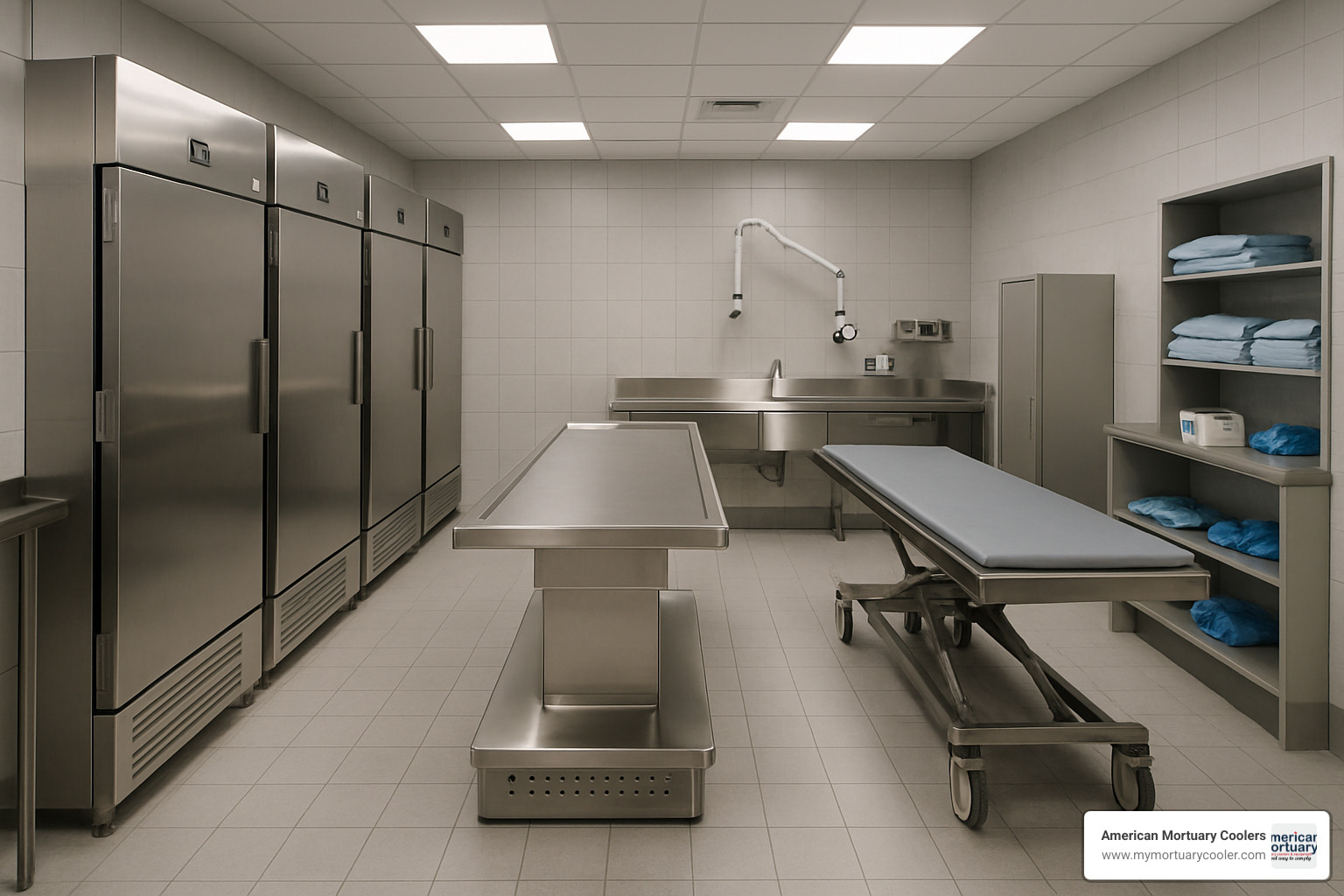
Preparation equipment works in concert with your refrigeration system. Your embalming stations, instruments, and ventilation systems should complement each other, creating an ergonomic workspace that protects both staff and the dignity of those in your care.
Don't overlook the importance of personal protective equipment. Quality gowns, gloves, face shields, and respiratory protection safeguard your team while they perform their essential work. As one industry veteran puts it, "The best PPE is the kind you don't even notice you're wearing because it's so comfortable and effective."
Documentation systems tie everything together. Temperature logs, chain of custody records, and inventory management tools create accountability and help you maintain the highest standards of care.
The accessories that make the biggest difference often include body boards for stable transfers, telescoping trays that slide out smoothly without full removal, and identification systems that prevent mix-ups. Many facilities also benefit from multi-tier rack systems, mobility-enhancing casters, and access ramps for roll-in units.
"We're not just supplying equipment," explains a workflow specialist. "We're raising the standard of care in laboratories by ensuring every component works together seamlessly."
Mandatory Certifications & Records
Staying compliant isn't just about avoiding penalties—it's about maintaining trust and demonstrating your commitment to excellence.
The alphabet soup of certifications each serves an important purpose. NSF Certification confirms your materials meet food-grade safety standards, while UL Approval verifies electrical components won't pose safety hazards. OSHA Compliance is non-negotiable, particularly regarding safety releases and ventilation systems.
Less familiar but equally important are ASTM E84 Testing (which checks flame and smoke spread ratings for insulation materials), ISO 9001:2015 (a quality management system certification for manufacturers), and CE Marking (showing compliance with European health, safety, and environmental standards).
Your documentation routine should become second nature. Temperature logs provide continuous verification that your units are performing correctly. Maintenance records create a paper trail of all service and repairs, which can be invaluable for troubleshooting and warranty claims.
Written cleaning protocols ensure consistency even when different staff members handle this essential task. Staff training certification demonstrates that everyone knows how to properly operate the equipment, and regular inspection reports verify ongoing safety and functionality.
"All our units meet or exceed the Federal Energy Independence & Security Act of 2007 requirements," one American manufacturer proudly notes. This focus on energy efficiency not only helps the environment but can significantly reduce your operating costs over the life of the equipment.
At American Mortuary Coolers, we understand that compliance isn't just a checkbox—it's a commitment to excellence that families notice and appreciate, even if they don't see all the behind-the-scenes details that make it possible.
Frequently Asked Questions About Morgue Refrigerator for Sale
How much space does a typical 3-body morgue refrigerator for sale require?
When you're planning for a morgue refrigerator for sale, space considerations are crucial. A standard 3-body unit typically needs about 57.5" × 8' of floor space with an 8' height clearance. Don't forget about the practical aspects of daily use, though! You'll need to add another 24-36" in front for door swing clearance.
I was just talking with a facility director last week who learned this lesson the hard way. "We measured perfectly for the unit itself," he told me, "but completely forgot about the space staff needed to safely move bodies in and out. We ended up having to reconfigure an entire wall!"
Side-loading models need additional clearance on their access side too. The good news is that walk-in units, while similar in external dimensions, can dramatically increase your capacity through clever internal rack configurations without demanding more floor space.
What voltage and ambient temperature do I need?
The electrical requirements for your morgue refrigerator for sale depend largely on its size. Smaller units (single and 2-3 body refrigerators) are wonderfully convenient, running on standard 110V service – truly plug-and-play solutions that won't require electrical modifications to your facility.
Once you move up to larger units with 4+ body capacity, you'll typically need 208/230V service. This might mean electrical upgrades for older buildings, so factor this into your budget planning.
As for temperature, most units are designed with a maximum ambient operating temperature of 95°F (35°C). I remember visiting a funeral home in Arizona that learned about this specification after their compressor failed repeatedly during summer months. The solution? They either needed better air conditioning in their storage room or an upgraded tropical-rated compressor package.
If your unit will be in an unconditioned space or a particularly warm climate, be sure to discuss this with your supplier. Operating outside recommended temperature ranges can not only void warranties but lead to premature equipment failure.
How often should I schedule professional maintenance?
Think of your morgue refrigerator for sale like you would your car – regular maintenance prevents costly breakdowns. While specific schedules vary based on usage patterns and manufacturer recommendations, here's a sensible approach:
Quarterly maintenance should include compressor and condenser cleaning along with refrigerant level checks. These simple procedures help ensure efficient operation and prevent energy waste.
Semi-annual check-ups should be more comprehensive, with a full system inspection and careful examination of door gaskets, which are often the first components to show wear.
Annual service should be a complete preventative maintenance visit including calibration of all temperature controls and testing of alarm systems.
Between these professional visits, your staff should perform daily temperature checks and weekly cleaning of accessible components. Many of our customers keep a simple maintenance log near their units to ensure nothing falls through the cracks.
I've seen how establishing a relationship with a qualified refrigeration technician familiar with mortuary equipment can make all the difference. As one of our long-time customers in Memphis puts it, "The money I spend on regular maintenance has saved me thousands in emergency repairs and, more importantly, protected our reputation by preventing any storage failures."
When it comes to mortuary refrigeration, preventative care isn't just about equipment longevity – it's about maintaining the dignity of those in your care and the peace of mind of their families.
Conclusion & Next Steps
Finding the perfect morgue refrigerator for sale isn't just about making a purchase—it's about making a thoughtful investment in your facility's future. After exploring all the options, features, and considerations, you're now equipped to make an informed decision that will serve your operation and the families you help for many years to come.
Think of your morgue refrigerator as the silent backbone of your facility's care services. It works around the clock, maintaining dignity and proper preservation when families need it most. That's why taking these final steps is so important:
First, take time to thoroughly assess what your facility truly needs. Grab a notebook and jot down your typical case volume, available space, and any special requirements that might be unique to your operation. Having this information ready before you speak with suppliers will save you time and help narrow your choices.
Next, don't settle for the first quote you receive. Reach out to at least three reputable manufacturers and compare what they offer. You might be surprised by the differences in not just pricing, but also in features, warranty coverage, and delivery options.
One of the most valuable things you can do is speak with current users of the models you're considering. There's nothing quite like hearing first-hand experiences from someone in a similar facility. Ask about reliability, customer service response times, and any unexpected issues they've encountered.
The refrigerator you choose today will likely be with you for 15-20 years. Consider how your facility might grow or change during that time. Might you need more capacity in the future? Would a modular system make more sense than a fixed unit?
While budget considerations are always important, quality and reliability should be your top priorities. The consequences of equipment failure extend far beyond inconvenience—they affect public health, family experiences, and your facility's reputation.
At American Mortuary Coolers, we understand the weight of this decision. Our team specializes in crafting custom solutions custom to your specific requirements, with convenient delivery across the contiguous 48 states from our locations in Johnson City, Atlanta, Chicago, and other major cities. We're dedicated to providing durable, efficient refrigeration systems that maintain the dignity of the deceased while supporting the important work you do every day.
More info about leading morgue coolers
The right morgue refrigerator for sale becomes a trusted partner in your mission to serve families with dignity and respect during their most difficult times. Choose thoughtfully, maintain it diligently, and your refrigeration system will provide reliable service that helps you focus on what matters most—caring for families when they need you most.


















